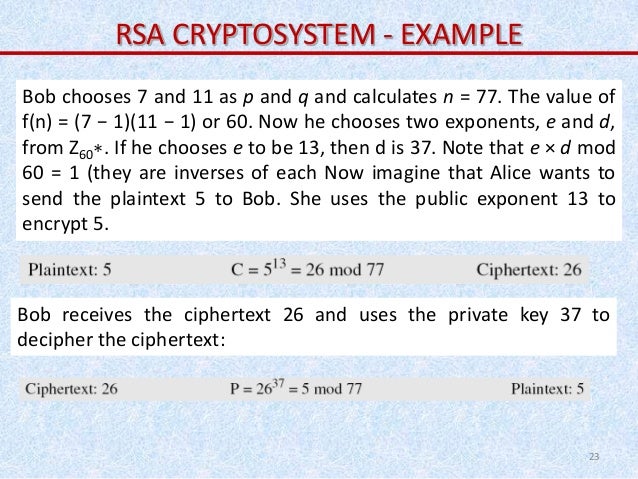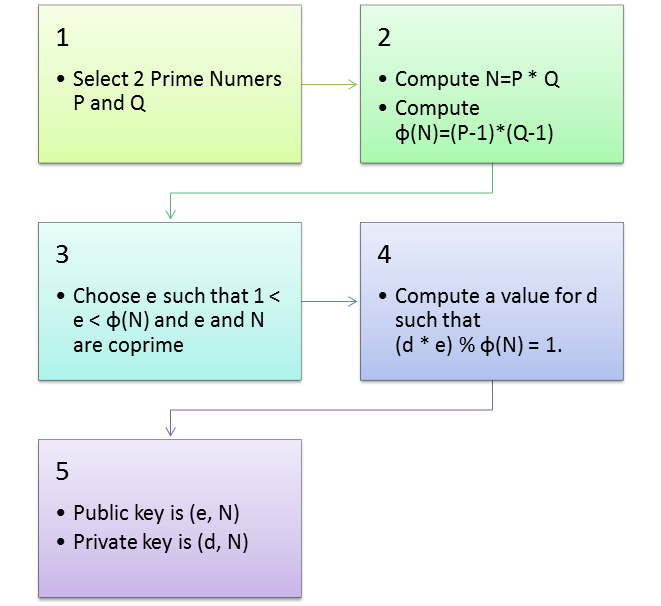Rsa_private_decrypt Example
Posted : admin On 07.01.2020Yiping Zou 21-Jun-Jun-04 17:01I have an assignment: I was given an encrypted file( was encrypted using 512 bit RSA), and a private key pair D, N)- 64 bytes hex ascii. Both D and N are Big Endiand format. I need to write a program to decrypt the encrypted data. I saw your article and source code which implement the encryption and decryption by 32 bit. I do not know how to do with 512 bit.
As I cannot simply use the mod function to calculate by using 64 bytes data.Do you have any idea to help me?Yiping. Mustafa Demirhan 6-May-03 9:396-May-03 9:39Man, this will not work in real world. You cannot check a 100 digit number using that way. It will take forever.Also, using rand function to generate a prime number is not a good idea too. The main reason is that it is predictable and it is better to use a cryptographic random number generator. Also in you implementation you just get the value of the random number generator.
Rsa_private_decrypt Example Sample
This mean that your key will most probably be smaller than 32 bits.Another important thing: The two prime number that you generate should NOT be close to each other. For example, if you use 100 digit number, it is a good idea to use one 99 and one 100 digit prime numbers.
If the value of those prime number are close to each other, there is a very good reverse engineering mechanism that will allow people to find both your prime numbers very fastly.Anyway, I think your implementation of RSA is just a school homework. This is not even close to a real implementation and should not be used in practice (even with large numbers). In fact it will take more than a million years to generate a random number with your methodMustafa DemirhanID 100.9935:zoltrixThey say I'm lazy but it takes all my time.
Code: Starting program: /src/RHID/src/rhid/myrsaRSA check key goodKey: 0000 004 353 /./End of block - 10 bytes - /./Encrypted: 25 B7C0A681 100980C2 455DE426 8CFEC616 /.E.&./0016 0010 5332E746 E1D6B1F 0637FF75 /. S2.F.E.R.7.u./0032 0020 166FD204 607E5736 6FB36C6A D4989159 /.o.`W6o.lj.Y./0048 0030 A1791E0D DE21B780 FF7E7483 1208D16C /.y.!t.l./0064 0040 B39AC2CA 2B1A1943 A2A6451E 88EA3B25 /.+.C.E.;%./0080 0050 2046BE47 67117F16 20D8FEB9 2E01E72F /.

F.Gg././0096 0060 CDCAF35C D082EF4B 75B5E4DF 75B00CA1 /.Ku.u./0112 0070 0AE65593 DA1F6003 F1534C87 E3AC894A /.U.`.SL.J./0128 0080 B2995F81 BFD46FA8 F8B7614 /.o.Dp%uv./0144 0090 6A71412 7C0CD65C 3C03CA48 /. jp.p. Code: // I'm assuming Key is the contents of 'public.txt' here.// It needs about 500 bytes of storage so your original Key definition won't do// as it was only 11 bytes.BIO.Public = BIOnewmembuf( Key, -1 );MyRSA = PEMreadbioRSAPublicKey(Public, NULL, NULL, NULL);The ciphertext includes padding and is as large as you asked it to be. You asked for 2048 bits, i.e., 256 bytes. The size of the plaintext that can be encoded depends on the padding scheme. With the one you chose, it must be less than RSAsize(rsa) - 11, or 245 bytes.There is no way to mark threads as 'solved'.I am really confused now.

What I want is to keep the public and private keys in memory. Code: Write: error:2007507E:lib(32):func(117):reason(126)0000 0000 00EFDCF7 FF7F000 00000000 /./0016 000 000000 /./0032 000 000000 /.' Nextlimit maxwell render.
Rsa Private Key Example
./0048 000 000000 /. D`./0064 000 000000 /./0080 000 000000 /./0096 000 00000000 C85B97F7 FF7F0000 /./End of block - 112 bytes - /./Read: error:09072007:lib(9):func(114):reason(7)Sorry to be a pain in the ass but I am lost. The thing is I got this to work once but then I fixed it! Now I can't get it right.Thanks again for all your time.
We generate the key pair as before (this time with a generalized key length and public exponent), but now we used BIO structs to separate the public and private key. BIO’s are just an OpenSSL abstraction to make our lives easier. We use the PEMwritebioRSAPrivateKey function and it’s public key counterpart to copy the private and public keys into the newly created BIO structs. We then use the BIOpending function to get how long our plain text character strings need to be to store the keys and allocate that amount of memory. From there, BIOread copies the keys from the BIO structs into the character strings.

Rsa_private_decrypt Example For Kids
Finally, let’s print them out for fun. Here’s an example of a key pair I generated via this method:I got this code to work. Code: BIO.pri = BIOnew(BIOsmem);BIO.pub = BIOnew(BIOsmem);PEMwritebioRSAPrivateKey(pri, MyRSA, NULL, NULL, 0, NULL, NULL);PEMwritebioRSAPublicKey(pub, MyRSA );sizet prilen = BIOpending(pri);sizet publen = BIOpending(pub);char.prikey = malloc(prilen + 1);char.pubkey = malloc(publen + 1);BIOread(pri, prikey, prilen);BIOread(pub, pubkey, publen);prikeyprilen = '0';pubkeypublen = '0';printf('n%sn%sn', prikey, pubkey);Thanks again for your patience.